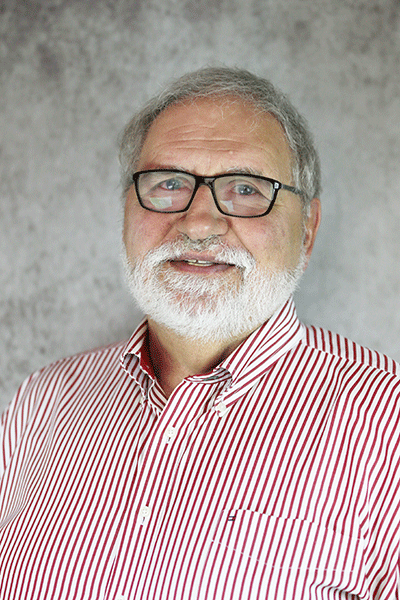Educating Educators: An Interview with Frank del Favero
Dr. Frank Del Favero is the graduate program coordinator of the master’s degree program in educational leadership and has been teaching at UL Lafayette for 12 years. Learn more — in his own words — about the challenges and excitement of educating educators and the educational leadership program at UL Lafayette. 
What is unique about teaching teachers in the educational leadership degree programs?
The classroom interactions are really good. Teachers know in the back of their minds what a classroom interaction should really be like and they subconsciously do it. We don’t have any problems with anybody sitting back and not participating. They’re not afraid to speak up and they’re all actively involved. I try to use my classroom and what I’m teaching as a model of good instruction.
Our students have a lot of prior knowledge about assessment and instruction, so it’s easy to build on their knowledge base. It’s a lot more of a challenge to teach something that the students have no background in.
What skills do you focus on teaching your students?
My favorite areas are assessment and leadership skills and qualities—what you need to know and do to run a building and supervise a faculty and staff. To teach those skills, I give examples of how I’ve done things in the past as a leader. I like to tie in actual experiences with what we’re reading in the textbooks and the articles. There’s nothing like real-world experience to back up something that’s presented in an article.
My favorite word is empathy. I say that the sign of a good leader is someone who has lots of empathy. A good leader will look at a problem from the other person’s perspective and not just his or her own. A good leader needs to realize that the other person’s perceptions are reality and deals with problems from that person’s point of view.
What’s your approach to teaching those skills?
What drives us and the program is our motto: learn it Monday night, use it Tuesday morning. Everything our students do relates to what they can bring back to their respective schools.
Our students serve on leadership committees and on school improvement teams. This places them in a position to share what they learn with their administration. All our students’ projects can be used in their respective schools. For example, I teach a course in data analysis. I teach them how to collect and analyze the data. This process includes root cause analysis. This process exposes the cause(s) of a problem and not just the symptoms. Our students pull it all together and produce a school improvement plan. It’s not a make-believe improvement plan -- it’s the real thing, because they’re using their own school’s data to identify areas of concern and to find solutions to problems.
Once our students identify an area of concern in their school, the next semester they take a research course where we teach them how to find research-based solutions to the problems they uncovered., They create a literature review based on their research findings that they can hand to the school improvement team.
Their schools are their laboratories. Our students don’t take tests or write term papers. Our faculty members are firm believers in authentic assessment. All of our assignments involve the creation of projects that can actually be used in our students’ respective schools In addition to school improvement plans, our students produce school visions, and building health and safety audits which can actually be used in their home schools. In fact, we grade their projects as if we were their immediate supervisors in a school setting.
How do schools and school districts benefit from teachers who graduate from the program?
We’ve had a lot of graduates from our program earn appointments as principals and assistant principals as well as a myriad of other administrative positions. In fact, several of our current students are working as teachers under the supervision of people which we have trained. In some school districts, we work with the school administrators to help identify their next leaders, and we’ll start a cohort in those districts so they have people who are ready to take over roles as principals, vice principals, and other administrative positions. Then, our professors drive every week.to districts across the state and teach classes to the cohorts
Many of our students, when they first start, don’t intend to become principals or supervisors. But it’s funny—by the time they leave, many of them say, ‘You know what? I want to become a principal.’ And they do! What’s satisfying is to see them coming in thinking like a classroom teacher, but by the time they complete the program, their thinking and their perspective have evolved from a narrow classroom perspective to a building-level perspective.They start thinking like an administrator. We get a great deal of satisfaction seeing teachers evolve into leaders.
What do you like best about teaching educational leadership?
You know, I worked in New York state as a teacher and a principal for about 36 years. I retired at 55, and I wanted to get into postsecondary education. I like teaching, and while I was a 7-12 teacher I realized I could have an immediate impact on the kids that I taught in my classroom but on no one else. I became an administrator because I realized that I could achieve a great deal more and impact an entire building full of kids rather than just a classroom
From there, I said, ‘If I can train a group of people who are going to become principals, think about how much impact I could have.’ So, if I train 20 principals each year with 500 students each, I’ve been able to indirectly impact 10,000 students, and I think that’s pretty cool.
